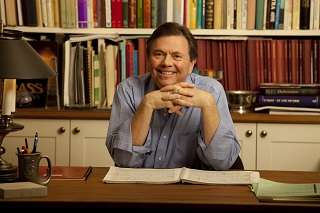|
Back
Memorializing Mozart: Mozart’s Last Year Palm Beach
Kravis Center for the Performing Arts
12/02/2021 -
Wolfgang Amadeus Mozart: Overture to Die Zauberflöte, K. 620 – Clarinet Concerto in A Major, K. 622 – Requiem in D Minor, K. 626 – Ave verum corpus, K. 618
Robyn Marie Lamp (soprano), Robynne Redmond (mezzo-soprano), Jason Ferrante (tenor), Richard Ollarsaba (bass), Jon Manasse (clarinet)
Master Chorale of South Florida, Palm Beach Symphony, Gerard Schwarz (conductor)

G. Schwarz (© VanHouten Photography)
“It’s collective effervescence,” the brilliant clarinetist Jon Manasse told me over dinner after this concert of selections from the last year of the short life of Wolfgang Amadeus Mozart. The term that inspired Manasse comes from the French sociologist Emile Durkheim, who invented it to describe the communal feeling that animates religious worship. But it works just as well with the creative intimacy that arises from shared cultural experiences. Some 230 years have passed since Wolfgang Amadeus Mozart expired at age 35 in 1791, yet his last months on earth – indeed, even his final hours – left a musical legacy bubbling with effervescence.
As one of the first arts companies to return to live performance as the pandemic subsided, the Palm Beach Symphony has been a vital part of South Florida’s cultural scene, which has rocketed to national importance and richly deserves international notice. Only a few years ago, the ensemble gave concerts in schools and private homes. Now under spectacularly innovative musical and administrative direction, and exponentially popular in this high-growth community, it performs to nearly sold-out audiences in West Palm Beach’s capacious Kravis Center for the Performing Arts.
Manasse, who teaches at Juilliard as well as at Lynn University, in nearby Boca Raton, Florida, brought the evening to stratospheric heights as the soloist in Mozart’s Clarinet Concerto, a less frequently performed work that Mozart wrote for his friend and fellow freemason, the clarinetist Anton Stadler. Completed just two months before the composer’s death, it put the clarinet on the map as a solo instrument of equal importance to the more traditional ones favored up to that time. It is difficult to image a more intuitive, soulful, and dare I even say perfect performance than the one Manasse delivered. He played nimbly and without excessive delicacy, radiating an almost surreal clarity in each of the concerto’s three movements, all of which pose distinct challenges of range and intensity. After the first, “Allegro,” movement, much of the audience broke convention and burst into applause.
The synergies with the orchestra were certainly helped by the enormous energy of the Palm Beach Symphony’s music director Gerard Schwarz, Manasse’s brother-in-law, who arrived here in 2019. He came just in time for the pandemic after a long and distinguished tenure at the Seattle Symphony, among other posts, including Lincoln Center’s Mostly Mozart Festival, a devotion certainly in evidence at this all-Mozart concert. Schwarz and Manasse performed a fine-tuned, integral performance of the concerto, with the soloist standing in front of the conductor’s podium. Schwarz’s authoritative baton was already well in practice, having opened the concert with a robust reading of the overture to Mozart’s opera The Magic Flute, most of which the composer wrote before turning his attention to La clemenza di Tito, conventionally regarded as his final opera. The missing piece was the overture, which Mozart completed two days before Flute’s premiere and just over two months before his death.
The exciting first half of the concert was followed by a steady, somber performance of Mozart’s Requiem, a secret commission on which he toiled until just hours before he died in December 1791. He famously left it unfinished, but after his death it was concluded and largely orchestrated by his student Franz Xaver Süssmayr in what turned out to be Süssmayr’s only lasting contribution to music. Once again Maestro Schwarz took a commanding approach not only of his orchestra but also of the esteemed Master Chorale of South Florida and soloists Robyn Marie Lamp, Robynne Redmond, Jason Ferrante, and Richard Ollarsaba. All sang competently, but Ollarsaba’s stentorian bass stood out for its clarity of tone and solidity of technique. Schwarz’s masterful conducting preserved the work’s essential tension throughout. Its concluding “Communio” part was followed – unusually but to sublime effect – by Mozart’s Ave verum corpus, a brief motet that he composed for Baden’s church choir earlier in his final year. With no pause between the motet and the larger choral piece, the motet flowed seamlessly from the Requiem and ended this splendid evening with an augury of hope.
Paul du Quenoy
|